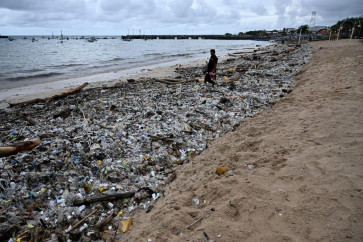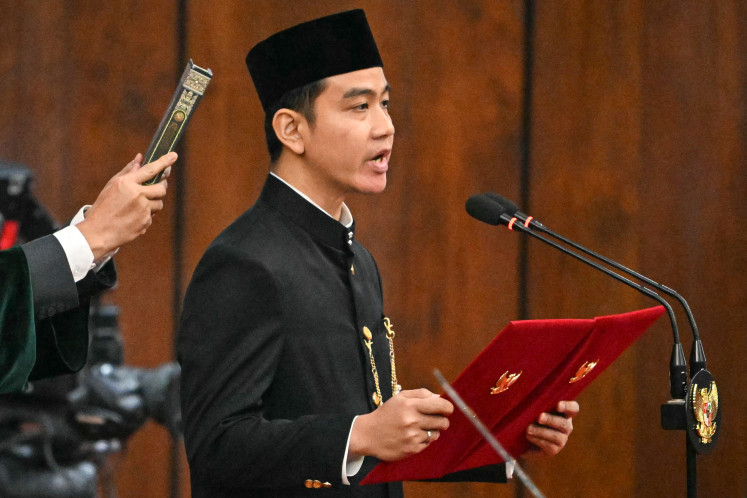ESG standards: Debate on business norms and ethics
If the ESG standards are implemented exclusively in the scope of business ethics, stakeholders will be able to largely differentiate “good businesses” from “bad businesses”.
Change text size
Gift Premium Articles
to Anyone

L
ately, the business ecosystem has been facing new set of criteria, namely the fulfillment of environmental, social, and governance (ESG) standards.
ESG standards have been discussed at the international level, such as through a United Nations initiative for 20 years. The idea of ESG standards was initially started during the debate between the “pro-industrialist” and “pro-conservation” sides regarding the future of the world’s economy and environment. The debate was later documented in the Millennium Development Goals (MDGs) and Sustainable Development Goals (SDGs), and cited by legal, economic and environmental experts in establishing the green growth economic theory.
Philp and Cooper (2004) explained that the green growth economic theory was later implemented in business practice through the ESG standards, which are deemed as part of the SDGs. The green growth economy itself is a form of compromise between the “pro-industrialist” and “pro-conservation” folks, also known internationally as sustainable business. Meaning, in this context, ESG is oriented toward sustainable green development.
Historically speaking, the ESG standards were born from the idea of business ethics, in which the industrialists believe that business actors are obliged to bring about benefits to society and must not cause negative impacts. From the perspective of business ethics, ESG standards are seen as a mechanism to avoid the exploitation of society and the environment for the sake of profits.
Furthermore, if the ESG standards are implemented exclusively in the scope of business ethics, they will be able to largely differentiate “good business” from “bad business”. Additionally, such implementation also means that the applicability of ESG standards relies solely on the commitment of business actors and stakeholders such as financing institutions and buyers.
For example, as of now, there are many international financing institutions, whether banking institutions or otherwise, which require the fulfillment of ESG standards as a condition to be eligible for funding and many buyers now also required the same.
From the perspective of business ethics, compliance with ESG standards only depends on the ethical judgment of stakeholders. Freeman and McVea (2001) explain that the concept of ethical judgment among groups and individuals who are stakeholders, can affect or be affected by the achievement of corporate goals. That means, referring to the business ethics approach, the fulfillment of ESG standards will very much depend on the dynamics of the relationship between the corporation and the stakeholders.
The nature of compliance in the preceding paragraph indicates that the fulfillment of ESG standards will become very transactional. For instance, the buyer may waive the fulfillment of ESG standards in exchange for a lower price, or the financial institution may waive it in exchange for higher interest rates.
Arguably, such fulfillment of ESG standards is not very effective. For a more effective approach, there must be clear and firm norms. The norms herein refer to laws and regulations with coercive power and possible sanctions in case of violation, similar to the case of anti-deforestation standards, which started as a business-ethics-centered movement and later became a binding norm in the European Union through the enactment of an anti-deforestation law in December 2022.
Currently, the applicable ESG standards worldwide are the ones established by the Global Reporting Initiative (GRI), which have been used all around the world (including in Indonesia) for the past several years for commercial, sustainability goals, SDGs and financial purposes. On the other hand, the Indonesian government is currently drafting its own ESG standards framework and guideline through the Finance Ministry, with the support of the United Nations Development Program (UNDP) and the World Bank since late 2022.
The next step is outlining those frameworks and guidelines into various regulations under the auspices of the Finance Ministry, such as in the regulations pertaining to infrastructure financing. The Financial Services Authority (OJK) has issued several regulations regarding the fulfillment of ESG standards, such as by mandating certain private companies to submit ESG fulfillment reports even though there is currently no clear measurement, validation and supervision mechanism.
Along with the Paris Agreement, which Indonesia has ratified and which gave rise to the obligation to fulfill the 2030 climate change nationally determined contributions (NDCs) and SDGs fulfillment target, ESG standards, which are an important element therein, must at least be regulated under a norm of the same level as government regulation. The business ethics approach will not be sufficient, for it entirely depends on the corporation and stakeholders’ commitments.
Likewise, a sectoral or ministerial regulation will also not be sufficient because ideally, the implementation of ESG standards must be massive and cross-ministerial. The umbrella norm, which becomes the basis for other implementing regulations, must cover the ESG fulfillment standards that are acknowledged by the Indonesian government, alongside specific reporting mechanisms and measurements.
Lastly, there must be firm sanctions for failure to fulfill ESG standards, and attractive incentives for the fulfillment of them, given that the entire process of ESG fulfillment and reporting entails very high costs.
The relevant institutions must also be able to supervise the fulfillment of ESG standards and impose sanctions, and in doing so, must be guided by a valid monitoring matrix to ensure correct implementation of ESG fulfillment as well as avoiding any abuse of power.
***
The author is an associate professor, carbon trading legal expert and lecturer at Prasetiya Mulya University. The views expressed are his own.









